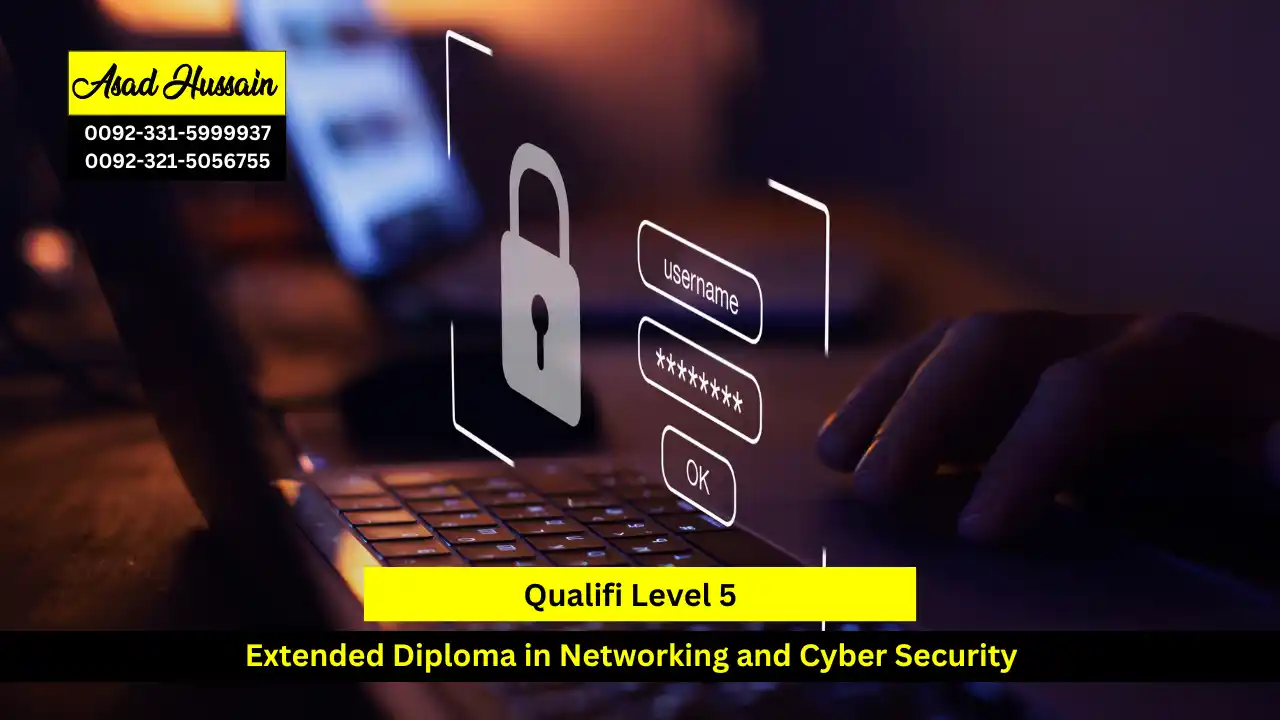In today’s fast-paced digital world, where technology evolves at breakneck speed and cyber threats grow increasingly sophisticated, having a robust understanding of networking and cyber security is more critical than ever. For those aiming to excel in these fields, the QUALIFI Level 5 Extended Diploma in Networking and Cyber Security offers a compelling pathway to advanced knowledge and career opportunities. In this blog post, we’ll explore what makes this qualification stand out and how it can set you on a path to success.
The QUALIFI Level 5 Extended Diploma in Networking and Cyber Security is a comprehensive, industry-recognized qualification designed to equip learners with the skills and knowledge needed to thrive in the dynamic fields of networking and cyber security. It sits at Level 5 on the Qualifications and Credit Framework (QCF) in the UK, which is equivalent to the second year of a bachelor’s degree. This diploma is ideal for individuals who have a foundational understanding of IT and wish to advance their expertise to a higher level.
If you’re considering pursuing the QUALIFI Level 5 Extended Diploma in Networking and Cyber Security, start by researching accredited institutions that offer the course. Review their entry requirements, course structure, and support services. Many institutions provide detailed information on their websites or through admissions teams who can assist you with any queries.
The QUALIFI Level 5 Extended Diploma in Networking and Cyber Security is more than just a qualification; it’s a gateway to a rewarding career in a crucial and growing industry. By equipping yourself with advanced skills and knowledge, you’ll be well-prepared to meet the demands of modern networking and cyber security roles. Whether you’re looking to advance your career or pivot into a new field, this diploma offers a valuable and respected credential to help you achieve your goals. Embrace the opportunity, invest in your future, and take the next step toward becoming a leading professional in the world of IT and cyber security.
Program Highlights
The Qualifi Level 5 Extended Diploma In Networking And Cyber Security consist of 240 credits for the completed qualification.
Mandatory Units
- Cyber Security Threat and Risk
- Network Security and Data Communications
- Database Security and Computer Programming
- Incident Response, Investigations and Forensics
- Security Strategy: Laws, Policies and Implementation
- Physical IT Networking
- Cryptography
- Digital Investigations and Forensics
- System Administration
- Network Routing and Switching
- Network Design and Administration
- The qualification has been designed to be accessible without artificial barriers that restrict access. For this qualification, applicants must be aged 18 or over.
- In the case of applicants whose first language is not English, then IELTS 6 (or equivalent) is required. International qualifications will be checked for appropriate enrolment to UK higher education postgraduate programmes where applicable. Applicants are normally required to produce two supporting references, at least one of which should preferably be academic.
Cyber Security Threat and Risk
- Identify and evaluate various types of cyber security threats and vulnerabilities.
- Assess the potential impact of different threats on organizational assets and data.
- Develop and apply risk management strategies to mitigate identified threats.
- Analyze real-world case studies to understand the effectiveness of different threat response techniques.
Network Security and Data Communications
- Understand and implement network security protocols and measures to protect data in transit.
- Analyze and secure network communications against potential threats and vulnerabilities.
- Evaluate the effectiveness of various network security tools and technologies.
- Design and manage secure communication channels within an organization’s network.
Database Security and Computer Programming
- Implement security measures to protect databases from unauthorized access and breaches.
- Understand and apply principles of secure programming to prevent vulnerabilities in software.
- Evaluate and apply encryption techniques for data protection in databases.
- Develop secure database management practices and policies.
Incident Response, Investigations and Forensics
- Develop and execute incident response plans to effectively handle security breaches.
- Conduct thorough investigations to identify the causes and impacts of security incidents.
- Apply digital forensics techniques to collect and analyze evidence in security incidents.
- Prepare comprehensive reports and documentation for incident findings and responses.
Security Strategy: Laws, Policies and Implementation
- Understand and apply relevant laws and regulations affecting information security.
- Develop and implement organizational security policies and procedures.
- Assess and ensure compliance with legal and regulatory requirements in security practices.
- Evaluate the effectiveness of security policies and recommend improvements.
Physical IT Networking
- Design and implement physical network infrastructures that support organizational needs.
- Understand and manage the physical components of networking, including cables, switches, and routers.
- Evaluate and ensure the physical security of IT networking equipment and facilities.
- Apply best practices for installing and maintaining physical network components.
Cryptography
- Understand and apply cryptographic techniques to secure data and communications.
- Evaluate different encryption algorithms and their applications in protecting sensitive information.
- Implement cryptographic measures in various systems and platforms.
- Analyze the effectiveness and limitations of cryptographic solutions in real-world scenarios.
Digital Investigations and Forensics
- Apply digital forensic methods to investigate and analyze electronic evidence.
- Understand the legal and ethical considerations in digital investigations.
- Utilize forensic tools and techniques to recover and preserve digital evidence.
- Prepare detailed forensic reports and present findings in a clear and objective manner.
System Administration
- Manage and configure operating systems and network services effectively.
- Implement and maintain system security measures and updates.
- Diagnose and resolve system-related issues to ensure optimal performance.
- Develop and execute system backup and recovery plans.
Network Routing and Switching
- Design and implement routing and switching solutions to optimize network performance.
- Configure and manage network devices to ensure efficient data flow and connectivity.
- Troubleshoot and resolve routing and switching issues in a network environment.
- Evaluate and apply advanced routing protocols and switching technologies.
Network Design and Administration
- Design and implement scalable and efficient network architectures based on organizational requirements.
- Administer and manage network resources, including IP addressing and network services.
- Evaluate and optimize network performance and reliability.
- Develop and enforce network administration policies and procedures.
The QUALIFI Level 5 Extended Diploma in Networking and Cyber Security is designed for individuals who are passionate about advancing their careers in the IT and cyber security sectors. It is ideal for those who already possess a foundational understanding of IT principles and are looking to deepen their expertise in specialized areas such as network security, incident response, and cryptography. This course is particularly suited for IT professionals seeking to transition into more advanced roles, recent graduates aiming to bolster their qualifications, and individuals aiming for career advancement in a rapidly evolving field. By providing a comprehensive and practical education, the diploma equips learners with the skills needed to address complex security challenges and excel in high-demand positions within the industry.







